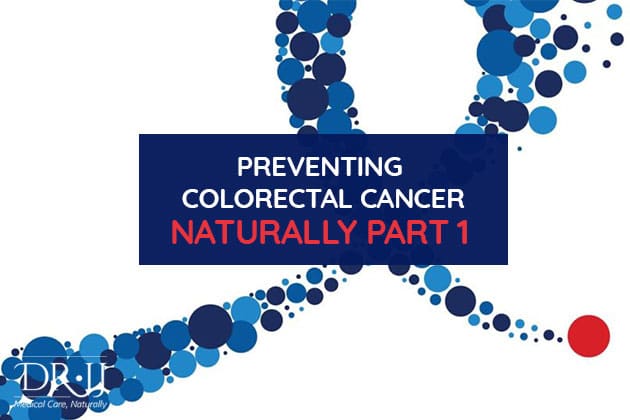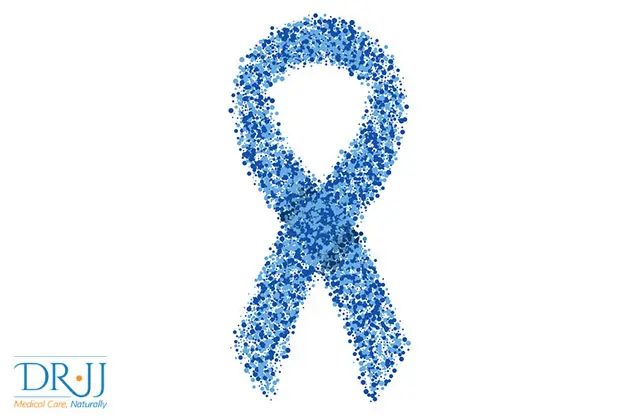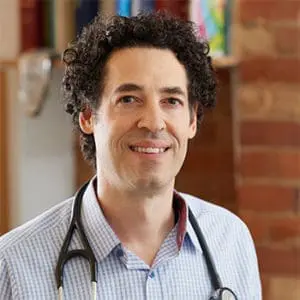
Cancer relates to numerous diseases in which cells grow and divide uncontrollably, attacking and destroying normal body tissue.
Colorectal cancer is cancer of the colon (large intestine), or rectum.
While there is currently no known cure for colorectal cancer, there are some known causes for it.
The causes may differ person to person based on a variety of factors.
With some care, you can take measures to reduce your risk for these causes, and ultimately your risk for colorectal cancer.
A naturopathic doctor can help assess your risk of developing colorectal cancer and provide preventative strategies.
In this two-part article series, we’ll look at natural solutions for cancer prevention.
We’ll also be looking at the primary causes of colorectal cancer, so when it comes time to talk about prevention, you’ll have a better understanding of what we’re looking at.
But first, let’s talk about what colorectal cancer is, and what it looks like.
What Is Colorectal Cancer?
Colorectal cancer occurs when adenomatous or hyperplastic polyps begin to form on the inner walls of the colon or rectum.
These polyps are formed when the body’s cells continue to grow and multiply.
In colorectal cancer, colon refers to the large intestine, and rectal, refers to the rectum, or anus.
Colon cancer can sometimes start as noncancerous or benign tumors, which can be identified and removed during colonoscopies in order to prevent them from progressing.
If you’ve been told that “polyps were removed during your colonoscopy”, these are the tumors they speak of.
Polyps often don’t cause symptoms.
This is why routine screening is recommended.
Naturopathic medicine can also help provide natural treatments if you’re undergoing chemotherapy or radiation for colorectal cancer.
Symptoms Of Colorectal Cancer
It’s difficult for you to tell if you’ve colorectal cancer without a proper screening.
Unfortunately, symptoms of colorectal cancer are often either absent, or not noticeable enough to warn you of cancerous growth.
Sometimes blood in the stool or constipation/diarrhea will send you to the doctor for investigation, but here are some other things to be aware of, and look for:
- Fatigue
- Weight loss or loss of appetite
- Changes in bowel movements
- Cramping, discomfort, or bloating in the belly
- The feeling that you can’t empty your bowels entirely
- Urgent or acute bowel movements
- You’ve been diagnosed with anemia, which could indicate bleeding in the intestine
- IBS (irritable bowel syndrome)
Pelvic pain is also a sign of progressed disease.
A clinical observation: if you’re a male, a post menopausal woman, or a non-vegetarian, your low ferritin, hemoglobin and/or red blood cell levels should always be investigated.
Low iron levels do not necessarily equate cancer, rather they could be due to a number of factors, like malabsorption, recent surgery, IBD (Crohn’s, colitis), menstrual bleeding and pain, or medications, etc.
Nonetheless, the cause of low iron levels should be investigated, and it’s a good idea to get tested to rule out colon cancer as one of the potential causes.
Screening is generally recommended for older males or post-menopausal women because they’re at an increased risk for colorectal cancer, but colorectal cancer can occur in anyone.
Stages Of Colorectal Cancer
There are 5 stages of colorectal cancer, starting with the earliest stage (stage zero), where it has only grown on the inner layer of the colon.
- Stage 1, the cancer grows to the next layer of tissue or muscle layer of the colon or rectum
- Stage 2, it reaches the outer layer of the colon, and the tumor is in other organs around the colon
- Stage 3, it reaches the lymph nodes
- Stage 4, it has progressed and spread to further sites in the body (metastasis)
Colorectal cancer is a recurrent cancer, meaning that it may return even after you’ve been provided treatment for it.
Naturopathic treatments can help you with post cancer prevention strategies to decrease your risk of recurrent colorectal cancer.
Causes Of Colorectal Cancer
While it’s not always possible to avoid getting colorectal cancer, there are ways to reduce your risk.
Here are five things you can look at, and possibly take action on, in order to reduce the need for medical intervention.
1. Genetics
Colorectal cancer is known to run through families, affecting multiple branches and generations.
This stems from a genetic mutation that predisposes a family member to the cancer, though it won’t develop until an environmental stressor triggers it.
Despite this, most times it occurs in outliers with no family history of colon cancer.
Unfortunately, there isn’t much you can do about genetics.
But if you know your family has a history of colon cancer, it can help you be more vigilant, and enroll in an early colon cancer monitoring program at your local hospital.
Genetic testing can also help you learn more about your genetics.
This can help you be proactive with reducing your risk of triggering environmental factors.
So, the positive is that you may still be able to control at least some of the variation in your chance of getting colorectal cancer.
This variation is in the environmental aspect, and can include changing your personal habits.
2. Personal Habits
If you’re obese, or have a more sedentary lifestyle, you’re statistically more likely to get colon cancer.
Changing this by moving and losing weight are great examples of steps you can take to reduce your risk.
Colon cancer affects the digestive system, so it makes sense that diet will affect your risk of getting cancer.
Changing your diet is a key component, and here are some tips:
- Increase your fiber, and zinc intake
- Reduce your fat and calorie intake
- Avoid alcohol and processed meats
- Be sure to include more protein than just red meat in your diet, such as fish, or organic poultry
Though it isn’t exactly related to diet, quitting smoking can also reduce your risk.
The toxins in cigarettes are a risk factor for colorectal cancer.
Quitting smoking can also reduce your risk of a variety of other types of cancer and diseases, like non-erosive reflux disease.
3. The Presence Of Precancerous Polyps
There are two different types of precancerous polyps: adenomas and hyperplastic.
These polyps differ in their structure and their risk of being cancerous or not.
Adenomas may look normal, but they can become cancerous.
Adenomas are responsible for the majority of colorectal cancer cases.
Hyperplastic polyps rarely turn into colon cancer, but they can.
Doctors will often remove them to avoid the risk of developing cancer.
If you’re predisposed to growing polyps, your doctor may schedule you for regular colonoscopies in order to seek out and remove these growths.
If they’re able to do so, the chance of avoiding colon cancer is very good.
If you do go through surgery to remove the polyps there are a number of post surgery supports that can help you to recover.
4. The Presence Of Diabetes
In a 2014 study by Luo, Lin, He, and Hendryx, a patient with pre-existing diabetes has an increased risk of developing colorectal cancer.
Not only are diabetics more likely to get colorectal cancer, but for those who have complications with their diabetes, they have an increased chance of mortality.
This is because diabetes is also linked to other chronic illnesses like high blood pressure, insomnia, and asthma.
When you can manage your diabetes with lifestyle changes, your odds of remaining cancer-free can improve.
5. The Presence Of Inflammatory Bowel Disease
IBS is a type of digestive issue that can cause issues with your digestive tract.
It can often cause fatigue and low energy levels.
A 2014 study by Kim and Chang explains that the presence of IBS or other conditions such as Crohn’s or colitis can increase the risk of developing colorectal cancer.
Cancer can also cause a decrease in the function of your immune system, as well as diminish your energy levels.
Reducing oxidative stress and adjusting your lifestyle can help with managing the symptoms of IBS, Crohn’s, or colitis.
Some of these naturopathic treatments may advise including apple cider vinegar, or probiotics into your diet.
Ask your naturopathic doctor to see how to best optimize your nutrition to decrease the risk of digestive issues, which can play a part in the development of colorectal cancer.
Questions? Ask Dr. JJ
In the next article (Part 2) on colorectal cancer, we’ll talk about natural solutions for colorectal cancer.
In the meantime, if you’re dealing with colorectal cancer, or have risk factors for developing colon cancer, please reach out and contact me to book a consultation.
If you’re looking for naturopathic ways to prevent your risk of developing colorectal cancer, I can help.
I’m Dr. JJ, a naturopathic doctor in Toronto, and I can work with you to optimize your health.
Book your appointment with me, Dr. JJ, today.
If you have questions about naturopathic medicine, or you’d like to take your first step into the world of naturopathy, contact me, Dr. JJ, and let’s book an appointment.
Yours in health,
Dr. JJ Dugoua, Naturopathic Doctor
600 Sherbourne St, Suite 315,
Toronto, ON M4X 1W4
-https://goo.gl/maps/6VDXwiCihRpDRo5A9
Dr. JJ Dugoua is a naturopathic doctor in Toronto and has a PhD in Pharmaceutical Sciences. His clinic provides solutions for many health concerns and has a special focus on thyroid health issues.



